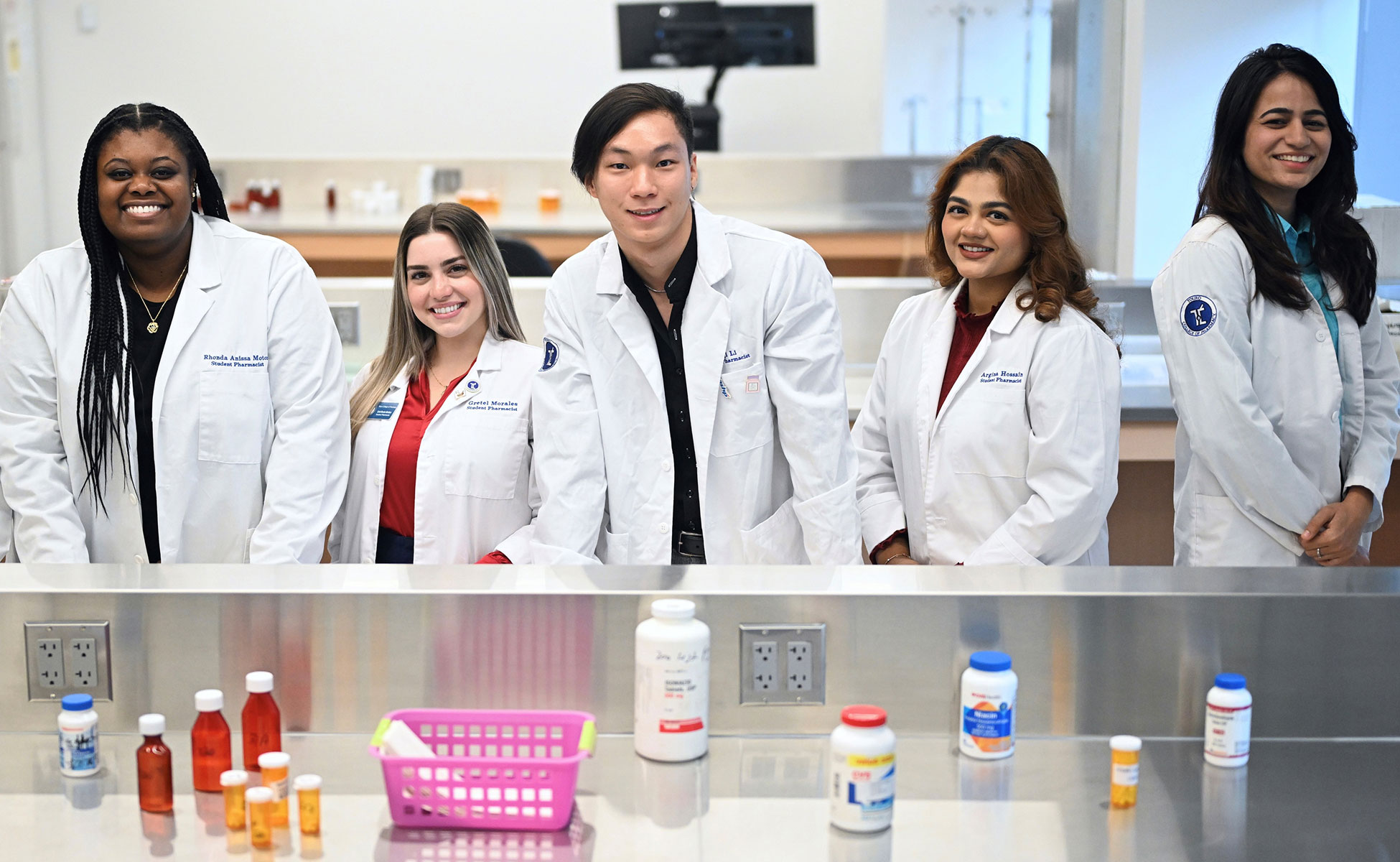Healthcare delivery has become increasingly complex and collaborative. Patient care is managed by an expert team with shared decision making and joint accountability. Today, interprofessional education (IPE) is necessary to create a health workforce that is collaborative and better prepared to respond to local health needs. TCOP embeds interprofessional education in the curriculum, stressing the importance of pharmacists working as part of a healthcare team, and providing an understanding of each healthcare provider’s role to optimize collaboration.
IPE learning opportunities at Touro College of Pharmacy including traditional courses, patient case stimulations, and clinical and field experiences with interactions with students from two or more healthcare disciplines. Located on the same campus with the Touro College of Osteopathic Medicine, and near sister Touro schools in a variety of healthcare professions, such as dentistry and physical therapy, we have many opportunities to work together.
There are four core competencies we use, based on Interprofessional Education Collaborative (IPEC), to assess IPE activities:
- Values/Ethics for Interprofessional Practice: Work with individuals of other professions to maintain a climate of mutual respect and shared values.
- Roles/Responsibilities: Use the knowledge of one’s own role and those of other professions to appropriately assess and address the healthcare needs of patients and to promote and advance the health of populations.
- Interprofessional Communication: Communicate with patients, families, communities, and professionals in healthcare and other fields in a responsive and responsible manner that supports a team approach to the promotion and maintenance of health and the prevention and treatment of disease.
- Teams and Teamwork: Apply relationship-building values and principles of team dynamics to perform effectively in different team roles.
Our IPE Curriculum:
SBAN 560 - Cultural Competency
This 1-credit P1 spring semester required course focuses on developing students’ cultural competence through knowledge, values, attitudes, and skills essential for effective healthcare delivery. Emphasizing the Interprofessional Education Collaborative (IPEC) core competencies—values/ethics, roles and responsibilities, interprofessional communication, and teamwork—students will explore the cultural contexts that shape healthcare beliefs of patients. Through in-class activities, case studies, personal narratives, and interprofessional activities, students will gain insight about the various patient demographics and the healthcare challenges faced by underrepresented and diverse patient populations, including those defined by race, ethnicity, gender, age, socioeconomic status, insurance coverage, religion, culture, sexual orientation, and physical or mental ability. The course also examines stigmatized health conditions such as COVID-19, HIV/AIDS, and mental illness in the cultural context. Interprofessional Education (IPE) sessions—collaborating with students from the Physician Assistant Program and other allied health fields—support the development of interprofessional practice (IPP) skills shown to enhance care quality and patient outcomes.
PHPN 684 & 695 - Foundations of Interprofessional Practice and Education Part I & II
This yearlong coursework given in the fall and spring semester to second-year PharmD students, is held in conjunction with students and faculty of other health care disciplines, including, but not limited to Touro College of Osteopathic Medicine, Touro College of Dental Medicine, and Touro College School of Health Sciences. The goals of this course are to provide experiences that will teach students how to work with other health disciplines, use the knowledge of their own profession to contribute to patient care within their scope, effectively communicate with professionals of other fields in a responsive and responsible manner, and to apply relationship-building values and the principles of team dynamics to work effectively with interprofessional team members to enhance care. The IPE activities might include:
- Simulation-based in the medical simulation-laboratory
- Case-based in class in which students work in small groups to compose a care plan for a given patient
- Virtual IPE experience in which groups of students simultaneously log-on to a virtual software platform to address a given patient case.
The activities break students into small interdisciplinary groups in which they address, discuss, and document the approach to their patient’s case. Previous events have included an IPE Escape Room activity with standardized patients, onsite IPE options with various disciplines involved, and virtual IPE activities as interprofessional student groups work to create an assessment and treatment plan for a complex patient case.
Annual Spring IPE Symposium with the School of Health Sciences
The annual Touro College School of Health Sciences Interprofessional Symposium is a required event for third-year PharmD students. Students are placed into interprofessional groups with students from various disciplines including mental health counseling, nursing, occupational therapy, pharmacy, physical therapy, physician assistant, speech language pathology, and social work. In the interprofessional teams, students comprehensively work up a complex patient case to plan how to treat the patient while hospitalized and upon discharge. This symposium focuses on interprofessional collaboration to achieve safe and stable transition for patients into their communities from healthcare settings. Symposium activities includes interprofessional breakout sessions with students and faculty. The goals of the symposium include identifying the value of interprofessional communication in the patient care planning process, understanding the role of the other disciplines participating in the care team, and working in collaborative, interprofessional teams to identify care plans for optimal patient treatment and care outcomes.
Advanced Professional Practice Experiences
In the third and fourth year, while at your clinical practice experiences, you will have additional clinical interprofessional education opportunities which will further your knowledge and application of the PPCP model, gaining a deeper understanding of the patient, health care team, and healthcare systems. Students actively and intentionally engage with various health professionals who work at that clinical site on various projects.


